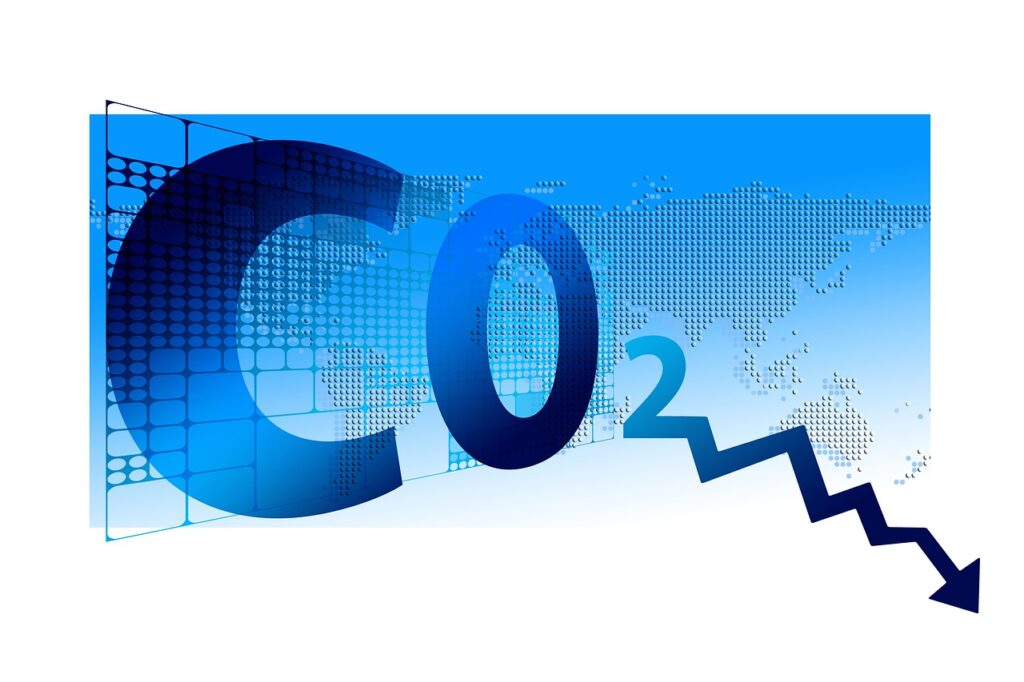Introduction
Climate change is a global issue that affects everyone, and the UK is one of the countries at the forefront of fighting this problem. UK has made significant strides towards reducing its carbon emissions in recent years and has set ambitious targets to become eco-friendlier in the future.
In 2019, the UK became the first major economy in the world to legislate for net-zero greenhouse gas emissions by 2050. This means that all greenhouse gases produced in the country will be either removed from or offset within its borders by this time.
The UK government’s plan to achieve net-zero involves a range of measures aimed at transforming transportation, energy production, construction, and agriculture sectors into more sustainable ones. These include investing heavily in renewable energy sources like wind power and solar energy as well as promoting electric vehicles.
Individuals can also play their part by making small but impactful changes by consciously choosing eco-friendly and sustainable products. By working together on both individual and national levels, we can make a positive impact on our planet’s health for generations to come. Combatting climate change requires collective action from governments, individuals and businesses alike. The UK has taken important steps towards becoming more eco-friendly but there is still much work left to do globally if we want to save our planet from irreversible damage caused by pollution and overconsumption of resources.
UK’s current stance on Climate Change
The UK has long been at the forefront of combating climate change. In fact, UK was the first country to introduce legally binding targets for reducing greenhouse gas emissions as early as 2008. Since then, the government has set even more ambitious goals in line with limiting global warming to 1.5 degrees Celsius.

In recent years, there’s been a renewed sense of urgency around addressing climate change considering the increasingly severe weather patterns and natural disasters. The UK government has responded by announcing its plan to achieve net-zero carbon emissions by 2050 – one of the most ambitious targets in the world.
Of course, achieving such a courageous goal requires comprehensive action across all sectors and industries. From investing in renewable energy sources to improving public transportation infrastructure and promoting sustainable practices among businesses and individuals alike – every effort counts towards mitigating our impact on the environment.
While much work remains to be done, it’s heartening to see that both UK governmental bodies and UK citizens are taking steps towards a cleaner and greener future for us all.
The impact of climate change on UK
Climate change has already caused significant impacts on the UK. One of the most apparent effects is the rise in temperature, which has increased by 1°C since pre-industrial times. This increase may seem small, but it has led to an escalation in extreme weather events such as heatwaves and flooding.
Even though greenhouse gas emissions are reduced, by the year 2100 the sea levels around the UK will rise. UK’s low-lying cities, coastal cities and some parts are at a risk of flooding. As droughts are expected, access to water will be a challenge. Due to extreme heat, Farming will be a bit difficult as a result of climate change.
The frequency of these events is expected to continue increasing with temperatures predicted to keep rising without action taken against climate change. Coastal communities are particularly vulnerable due to sea level rise, with some areas at risk of being submerged outright if emissions continue unabated.
Furthermore, wildlife habitats have been disrupted due to changing temperatures and rainfall patterns affecting flora and fauna species that rely on conditions for survival. Agriculture will also suffer from reduced yields due to droughts or floods damaging crops.
Climate change poses a looming threat not only to human health but also ecosystems crucial for maintaining life as we know it. The need for immediate action cannot be overstated – efforts must be made now before damage becomes irreversible beyond repair.
To help UK understand the climate change, every 5 years UK climate change risk assessment is published. To understand the future changes more details are available in UK Climate Projections.
You can also read the UN’s 2023 quarterly report on climate change.
How the UK plans to tackle climate change
The UK government has set ambitious targets for reducing carbon emissions and tackling climate change. Achieving net-zero carbon emission, reducing the amount of greenhouse gases released into the atmosphere to zero or offsetting them through measures such as planting trees.
To achieve this target, the UK is investing heavily in renewable energy sources such as wind, solar, hydroelectric power and biomass. In fact, in 2020 renewable energy accounted for a record-breaking 43% of the country’s electricity generation.
The UK is also adopting a circular economy model that focuses on waste reduction and recycling. This includes initiatives such as banning single-use plastics like straws and implementing deposit return schemes for drinks containers.
Moreover, the government is encouraging businesses to adopt eco-friendly practices through incentives such as tax breaks for companies that invest in green technologies or switch to low-emission vehicles.
While there are still many challenges ahead in fighting climate change globally, it’s clear that the UK government has taken bold steps towards achieving its net-zero emission goals by investing in clean energy sources and adopting sustainable practices at all levels of society.
UK’s plan to reduce emissions
The UK government has set ambitious targets to reduce emissions and tackle climate change. The plan includes reducing greenhouse gas emissions by at least 68% by 2030.
One of the keyways that the UK is working towards this goal is through investing in renewable energy sources such as wind and solar power. Offshore wind farms are being constructed around the coastlines of the country, with some experts estimating that they could provide more than half of the UK’s electricity needs in just a few years.
Another important strategy for reducing carbon emissions is encouraging people to shift away from fossil fuel-powered vehicles towards electric vehicles (EVs). The government has set a target to ban the sale of new petrol and diesel cars by 2030, with hybrid cars following suit five years later. This move will significantly reduce carbon emissions from road transportation.

In addition, there are also plans underway to retrofit homes and buildings with energy-efficient technologies such as insulation and smart heating systems. The UK plans on retrofitting buildings with insulation and upgrading heating systems to improve energy efficiency. By implementing these measures, homes will require less energy for heating which means fewer CO2 emissions. This will not only help reduce carbon emissions but also save homeowners money on their utility bills.
The UK government is encouraging businesses to adopt eco-friendly practices such as improving their supply chain management system and reducing waste generation through recycling programs. These measures show that the UK government is taking climate change seriously and making concrete efforts to combat it through a range of strategies focused on promoting eco-friendly practices while boosting economic growth.
UK strategies to fight climate change
Climate change is an imminent threat to our planet and every living being on it. As one of the leading nations in the world, the UK has a responsibility to take active measures to combat this issue. The government has introduced several strategies to fight climate change such as carbon taxes, renewable energy sources, nuclear power, and geoengineering. However, we must not underestimate the role of businesses and individuals in reducing carbon emissions.
Carbon taxes
Carbon taxes are one of the most effective strategies for reducing carbon emissions. Simply put, it’s a tax levied on the amount of greenhouse gas emissions produced by businesses and individuals. This encourages them to reduce their carbon footprint or pay more in taxes.
The UK introduced its first carbon tax in 2013 called the Carbon Price Floor (CPF). The CPF is set at a minimum price per tonne of CO2 emitted, which increases every year until 2025. This incentivizes companies to invest in low-carbon technologies to avoid higher costs.
Critics argue that this tax places an additional burden on businesses already struggling with economic uncertainty, but supporters say that it’s necessary to combat climate change.
Other countries have implemented similar policies, such as Sweden who has successfully reduced its carbon emissions by over 30% since introducing a carbon tax in the year 1991.
While not everyone may agree with implementing a carbon tax system, it remains one of the most effective ways to encourage sustainable practices and reduce our impact on the environment.
Renewable energy
Renewable energy is becoming increasingly popular in the UK to reduce carbon emissions and fight against climate change. These sources of energy are naturally replenished and do not contribute to greenhouse gas emissions, making them an attractive alternative to traditional fossil fuels.
Fortunately, there are several types of clean and eco-friendly energy sources that can be harnessed to power our world without harming the environment.

Solar energy is perhaps one of the most well-known forms of renewable energy, which harnesses the power of sunlight to generate electricity. Solar panels can be installed on rooftops or in large fields, and they work by converting sunlight into direct current (DC) electricity.
Wind turbines are another popular form of renewable energy that harnesses wind power to turn generators and produce electricity. Wind farms typically consist of multiple turbines situated in locations with consistent wind patterns such as coastal areas or mountain ridges.
Hydropower is generated from moving water, such as rivers or ocean tides, which turns a turbine to generate electricity. This type of renewable energy has been used for centuries but has recently gained more attention due to its potential for sustainable clean power generation.
Geothermal energy uses heat from deep within the earth’s core to create steam that powers turbines and generates electricity. It requires drilling deep into underground reservoirs where hot water and steam exist naturally.
Biomass energy comes from organic matter like wood chips, agricultural waste products or even landfill gas; it’s then burned to create heat or converted into biofuels for transportation purposes. While not as widely known as other forms mentioned above, biomass has significant potential because it makes use of materials that would otherwise go unused while reducing greenhouse gas emissions caused by burning fossil fuels.
Nuclear power
Nuclear power is often a heated topic when it comes to fighting climate change. While some argue that nuclear energy could be a feasible solution for reducing carbon emissions, others worry about the potential risks associated with nuclear power plants.
One of the main advantages of nuclear power is that it emits significantly less CO2 than traditional fossil fuels. This means that if we were to transition towards using more nuclear energy, we could potentially reduce our reliance on fossil fuels and subsequently decrease our carbon footprint.
However, there are also concerns surrounding safety in regard to nuclear power plants. Although they have improved over time, accidents such as Chernobyl and Fukushima serve as reminders of the dangers associated with these facilities.
Additionally, another concern is what to do with radioactive waste generated by these plants which can remain hazardous for thousands of years.
While there are benefits to using nuclear energy in the fight against climate change, it’s important to consider all aspects before making any decisions regarding its implementation in the UK’s strategy.
Geoengineering or Climate engineering
Geoengineering is a term used to describe large-scale interventions in the earth’s natural systems, such as the oceans and atmosphere, designed to mitigate climate change. These interventions could include things like seeding clouds with reflective particles or artificially increasing the reflectivity of Earth’s surface. While geoengineering has been proposed as a potential solution for mitigating climate change, it remains a controversial subject.
One concern about geoengineering is that it may have unintended consequences. For example, if we were to increase the reflectivity of Earth’s surface too much, this could cool the planet excessively and disrupt ecosystems around the globe. Similarly, if we were to tinker with ocean currents or modify rainfall patterns using technology like cloud seeding, this could potentially cause droughts or floods in unforeseen areas.
Despite these concerns, some proponents argue that geoengineering represents our best chance at mitigating catastrophic levels of warming over coming decades. As carbon emissions continue to rise unabated globally despite efforts by governments and individuals alike there are growing calls for more radical solutions such as those offered by geoengineering researchers. Ultimately though it remains unclear whether any form of geoengineering will prove feasible; both technically and politically speaking – since global governance structures capable of overseeing complex international agreements on these topics do not yet exist – let alone ethical enough given how little we currently know about its long-term effects on our planet
How individuals can help fight climate change
As individuals, we can all do our part in the fight against climate change. Here are some simple steps we can take to reduce our carbon footprint and help save the planet
1. Reduce energy consumption: Turn off lights when not in use, unplug electronics that aren’t being used and turn off your computer at night.
2. Use public transportation or carpool whenever possible: This reduces emissions from vehicles and helps cut down on traffic congestion.
3. Eat a plant-based diet: Eating less meat and dairy products can significantly reduce your carbon footprint.
4. Reduce waste: Recycle as much as you can, compost food scraps, avoid single-use plastics like straws and bags, and buy products with eco-friendly packaging.
5. Choose renewable energy sources: Consider installing solar panels or wind turbines for your home’s electricity needs or switch to a green energy provider.
By taking these small steps towards an eco-friendly lifestyle, we can collectively make a big impact in fighting climate change. Let’s work together to protect our planet for future generations!
Conclusion
The UK has made significant progress in fighting climate change. The country is committed to reducing its emissions and transitioning towards a more sustainable future through utilizing various strategies such as renewable energy, eco-friendly transportation systems, and others.
However, this fight against climate change is not limited to the UK alone; other countries are also taking actions in their own ways. It’s vital that all nations around the world work together to save our planet from further damage.
As individuals, we can also play our part by making small changes in our daily lives such as reducing waste production and using public transport instead of cars where possible.
Climate change poses an enormous threat to our environment and humanity’s existence on Earth. We must act quickly before it becomes irreversible. Every little step count in combating climate change – let us all be accountable for protecting our planet for generations to come!


[…] issues we face today. The UK has taken some positive steps towards reducing emissions and combating climate change through its ambitious climate targets and policies aimed at reducing carbon […]
[…] During the waste disposal, huge amounts of wastes combust to form greenhouse gases which leads to global warming and climate change. […]